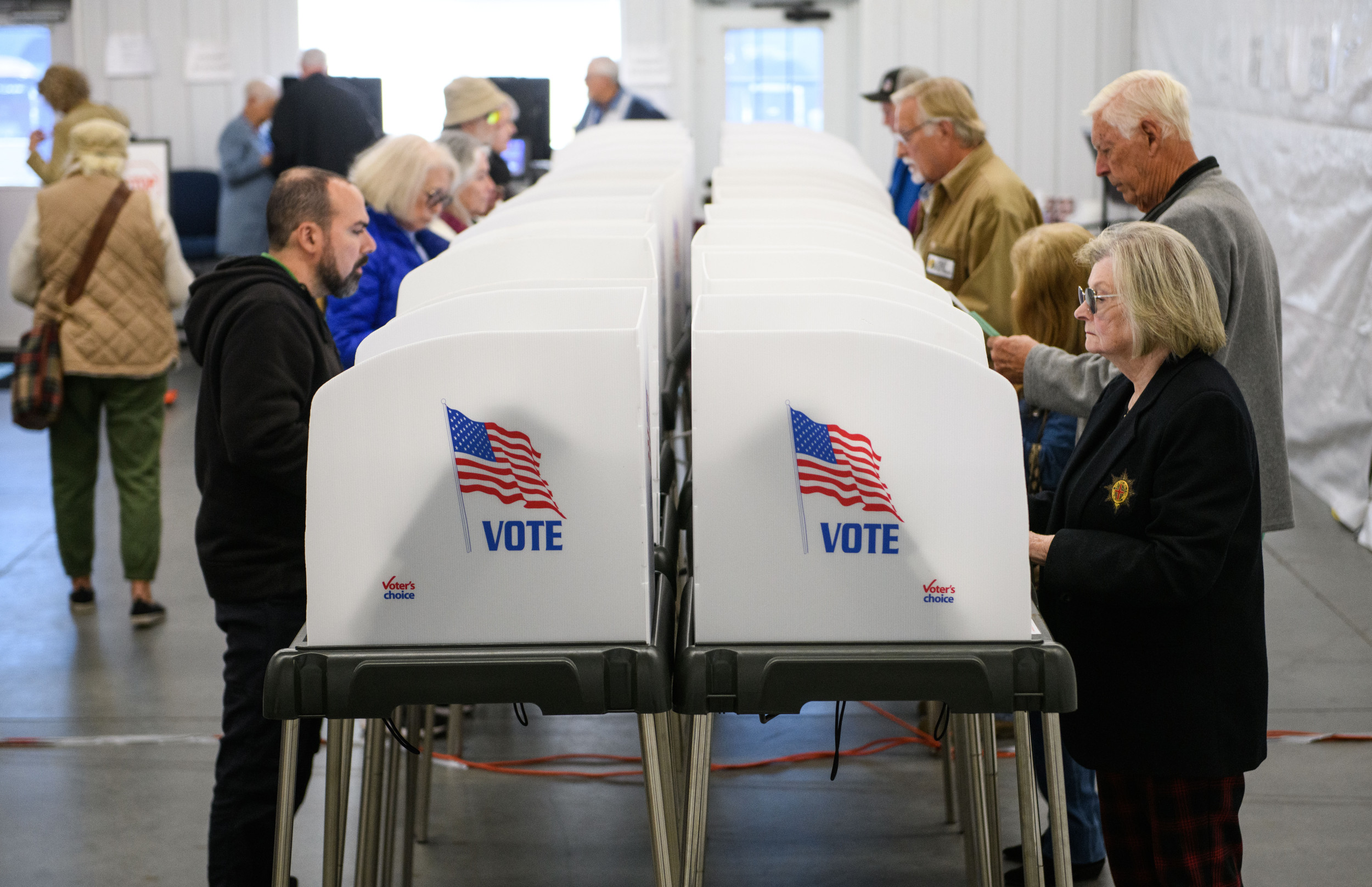The lawsuit, brought by the American Civil Liberties Union of New Hampshire, alleges that House Bill 1569 is unconstitutional because it places an undue burden on voting by requiring documents that not all residents can easily access, risking disenfranchisement. (Photo by Will Steinfeld/New Hampshire Bulletin)
Miles Borne, Alexander Muirhead, and Lila Muirhead didn’t vote in the 2024 presidential election. At the time, none of the three New Hampshire residents had turned 18.
But each will be legally old enough to vote by 2026. And they say a new state law requiring them to provide hard documentary evidence that they are citizens, such as with a passport or birth certificate, is going to “burden” their “ability to register to vote.”
Now, lawyers for the three hope a judge will agree.
They are part of a lawsuit against the recent state law, joining a diverse group of plaintiffs that includes the Coalition for Open Democracy, the League of Women Voters of New Hampshire, the Forward Foundation, and several individuals.
The lawsuit, brought by the American Civil Liberties Union of New Hampshire, alleges that House Bill 1569 is unconstitutional because it places an undue burden on voting by requiring documents that not all residents can easily access, risking disenfranchisement.
But as voting rights groups and the state of New Hampshire gird for potentially years of litigation, the plaintiffs face a more immediate question: Can they sue the state over a law that has not yet stopped them from voting?
Lawyers for the Attorney General’s Office, which is defending the law, say none of the plaintiffs — neither the prospective voters nor the organizations that say they are affected by it — are qualified to sue the state, a determination known as standing.
“Where is the direct impediment here?” Assistant Attorney General Michael DeGrandis asked in court.
The new law took effect Nov. 11 last year, a week after the Nov. 5 presidential election, and has not yet affected any statewide elections. It was in place during the town meeting season this spring, and advocates say at least 96 people were turned away from voting as a result of not possessing the proper documentation. But so far, none of those 96 people has joined the lawsuit.
Attorneys for the plaintiffs said under previous case law, the individuals and groups do not need to be directly disenfranchised to be harmed by the new statute.
“Those folks were injured as soon as the law was passed, as soon as the law came into effect,” Jacob van Leer, a staff attorney at the ACLU Voting Rights Project who is helping represent the plaintiffs, said at a press conference. “The urgency, I think, could not be more present here with the 2026 elections coming up.”
The arguments came to a head during a lengthy stretch of oral arguments in the U.S. District Court of New Hampshire last week. Judge Samantha Elliott is considering a motion by the state to dismiss the lawsuit entirely. Part of that motion is an argument that the law has not sufficiently harmed the people suing.
The fight over the new state law, which imposes the most stringent voter registration requirements in the country, comes as Republicans are pushing similar legislation on the national stage. On April 10, the U.S. House passed the SAVE Act, which would in part require hard documentary proof of U.S. citizenship for federal elections nationwide, but the bill is likely to struggle to overcome the 60-vote requirement in the Senate to escape a filibuster.
Meanwhile, President Donald Trump issued an executive order on March 25 that directed the U.S. Election Assistance Commission to require proof of U.S. citizenship. On Thursday, Judge Colleen Kollar-Kotelly of the U.S. District Court of Washington, D.C., granted a preliminary injunction to temporarily halt that order.
In the New Hampshire lawsuit, the plaintiffs say the state law will affect them in multiple ways.
McKenzie Taylor, the New Hampshire state director of America Votes, an advocacy organization, got married in 2024 and changed her last name; the name on her birth certificate is St. Germain, her maiden name. As of September, when the lawsuit was filed, Taylor had not updated her name on her passport or state driver’s license. In the lawsuit, she argues the new law would require her to do so in order to vote, a financial burden.
December Rust is an unhoused man living in Littleton without a passport or access to his birth certificate, who has argued he would not be able to easily obtain it. He has also argued that because the law eliminated challenged voter affidavits — which allowed people to cast a ballot even when an election observer challenged their citizenship or other qualification at the polls — he could be targeted by a challenge with no ability to defend himself.
Each advocacy organization involved says the new law impairs their ability to carry out their missions, which include helping residents register to vote.
DeGrandis argued each of the people or organizations suing is flawed. He argued the organizations have not sufficiently shown that HB 1569 is a threat to their missions.
“Open Democracy isn’t turning anyone away,” he said. “They’re providing this information. And if someone doesn’t have documentation, they’re saying you need that documentation. That’s not turning someone away, that’s advising.”
And he said the individual plaintiffs have not suffered injury from the law, and especially not injury with “actual or imminent concrete and particularized harm.”
“There’s a difference between preference and injury,” DeGrandis said. “That’s why the youth plaintiffs don’t have standing. They’re engaging in speculation regarding how the remedy would operate to remedy the harm that they allege.”
Elliott appeared skeptical of that critique.
“I’m confused as to your confusion,” she said. “They complained that they would have to bring documentation, and with the remedy, they would not need to bring documentation.”
And van Leer said the organizations faced an immediate impediment in understanding the law. “We still have no idea what it means to need other reasonable documentation proving citizenship. It makes it impossible for these organizations to provide clear voter registration services to voters when they themselves don’t know what that means.”
Lawyers for the ACLU filed the lawsuit early, in September, in order to secure an injunction against the new law before the next statewide elections in September 2026. The timing meant that none of the plaintiffs had been directly affected by the law when it was filed. But in court, they emphasized that a law can be blocked as unconstitutional even before it has disenfranchised someone, and noted that the lawsuit could proceed even if Elliott rejects some or even most of the plaintiffs, as long as she finds that at least one has standing.
Elliott at times appeared to agree with the argument that at least some of the plaintiffs had shown a burden.
“The issue is: What barrier does this law impose on voting?” Elliott asked. “In this case, the barrier that it imposes is this requirement to produce the identification.”
If the SAVE Act passes the Senate and is signed by Trump, or if Trump’s executive order survives a court challenge, New Hampshire could be required to participate in a national scheme very similar to HB 1569 — and one that would supersede that law and any block on it by a court. For now, attorneys for the plaintiffs say they are pushing the attempt to stop the state law from moving ahead.
“It seems like HB 1569 is a solution in search of a problem in ways that ultimately will require individuals to scrounge together very limited forms of documentation that many folks don’t have at all, and, even more, don’t have immediate access to in order to exercise their fundamental rights,” van Leer said at the press conference.













